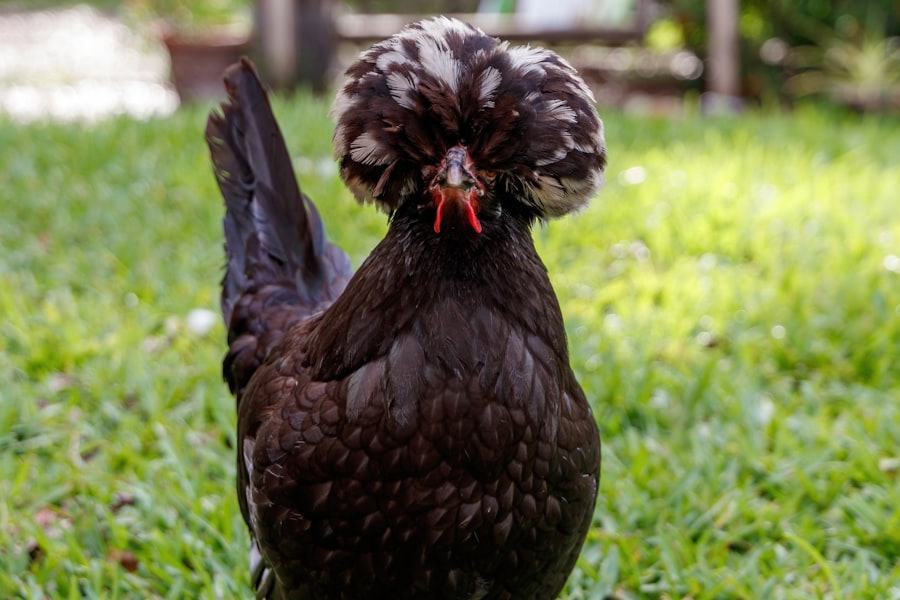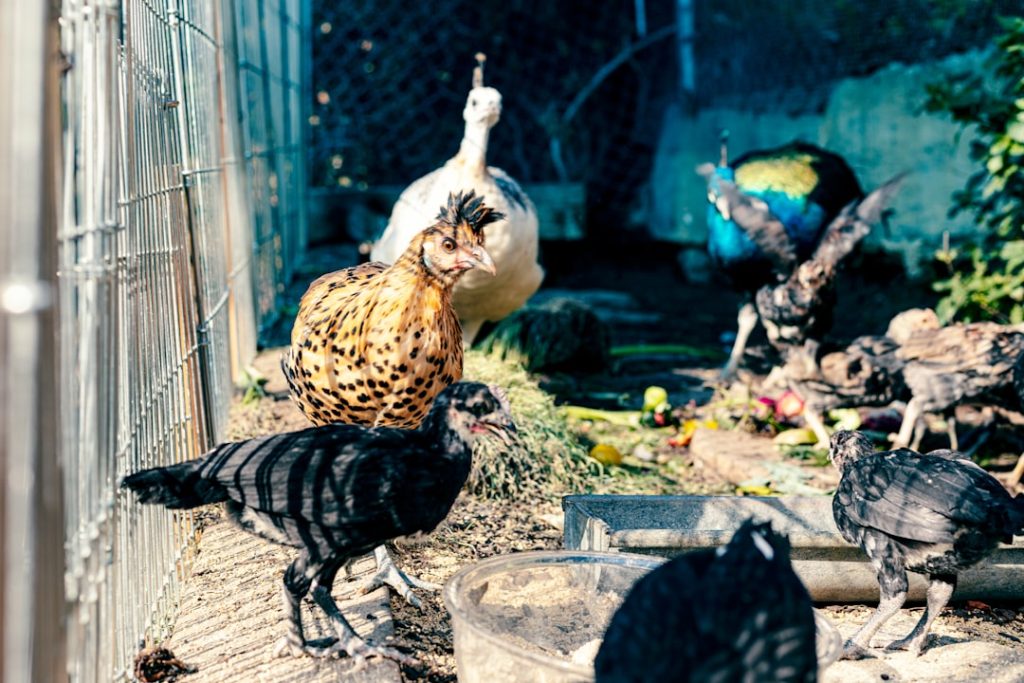Keeping backyard chickens offers numerous benefits. These include a consistent supply of fresh, organic eggs from humanely raised birds. Chickens also provide natural fertilizer for gardens, enhancing soil quality and promoting plant growth.
They serve as effective pest control, consuming insects and reducing the need for chemical pesticides. Chickens can help decrease household food waste by eating kitchen scraps and leftovers. Beyond practical advantages, chickens can be entertaining pets with unique personalities, appealing to both adults and children.
They contribute to sustainable living practices and environmental consciousness. However, chicken-keeping involves significant responsibilities. Daily care is essential, including feeding, watering, and coop maintenance.
Chickens require protection from predators and appropriate shelter from extreme weather. Potential chicken owners should carefully consider the time and resource commitments involved before deciding to keep a backyard flock. Despite these challenges, many find that the benefits of keeping backyard chickens outweigh the drawbacks, making it a rewarding experience for those willing to invest the necessary effort and resources.
Table of Contents
- 1 Understanding County Regulations and Zoning Laws
- 2 Choosing the Right Chicken Breeds for Your County
- 3 Creating a Safe and Healthy Environment for Your Chickens
- 4 Feeding and Caring for Your Backyard Chickens
- 5 Dealing with Common Challenges and Concerns
- 6 Connecting with Other Chicken Enthusiasts in Your County
- 7 FAQs
- 7.1 What are the benefits of keeping backyard chickens?
- 7.2 Are there any restrictions on keeping backyard chickens in certain counties?
- 7.3 How can I find out if my county allows backyard chickens?
- 7.4 What are some common regulations for keeping backyard chickens?
- 7.5 What should I consider before keeping backyard chickens?
Key Takeaways
- Keeping backyard chickens can provide a sustainable source of fresh eggs and natural pest control for your garden.
- Understanding county regulations and zoning laws is crucial before starting a backyard chicken operation to avoid potential fines and legal issues.
- Choosing the right chicken breeds for your county’s climate and regulations can ensure the health and productivity of your flock.
- Creating a safe and healthy environment for your chickens involves providing proper shelter, predator-proofing, and access to fresh water and nutritious feed.
- Feeding and caring for your backyard chickens requires a balanced diet, regular health checks, and proper waste management to prevent disease and maintain a clean coop.
- Dealing with common challenges and concerns such as predator attacks, egg production issues, and behavior problems requires proactive measures and knowledge of best practices.
- Connecting with other chicken enthusiasts in your county can provide valuable support, resources, and opportunities for learning and sharing experiences.
Understanding County Regulations and Zoning Laws
Understanding County Regulations
Each county has its own set of rules and regulations regarding the number of chickens allowed, coop size and placement, and distance from neighboring properties. It’s crucial to familiarize yourself with these regulations to ensure that you are in compliance with the law.
Compliance and Potential Issues
In some areas, keeping chickens may be prohibited altogether, while in others, there may be specific requirements that must be met to keep chickens legally. Failure to comply with these regulations can result in fines or even having to get rid of your chickens. Therefore, it’s essential to do thorough research and reach out to your local county office or zoning department to understand the specific regulations that apply to your area.
Neighborhood Concerns and Support
Additionally, it’s important to consider the concerns of your neighbors when keeping backyard chickens, as noise and odor can be potential issues. Open communication with your neighbors can help address any concerns they may have and foster a positive relationship within the community. Some counties have specific programs or initiatives that support urban agriculture and backyard chicken keeping, offering resources and support for those interested in keeping chickens, as well as providing guidance on how to do so in a responsible and sustainable manner.
Choosing the Right Chicken Breeds for Your County

When it comes to choosing the right chicken breeds for your backyard flock, there are several factors to consider. First and foremost, it’s important to choose breeds that are well-suited to your specific climate and environment. Some breeds are more cold-hardy, while others are better suited for hot climates.
Additionally, some breeds are more adaptable to free-ranging, while others are better suited for confinement. By choosing breeds that are well-suited to your county’s climate and environment, you can ensure that your chickens thrive and remain healthy. Another important factor to consider when choosing chicken breeds is their egg-laying capabilities.
If you are primarily interested in keeping chickens for their eggs, it’s important to choose breeds that are known for their high egg production. Some breeds are prolific layers, while others may lay fewer eggs or only during specific seasons. Additionally, some breeds are known for laying eggs of a specific color or size, which can add variety to your egg basket.
Beyond practical considerations, it’s also important to consider the temperament and behavior of different chicken breeds. Some breeds are known for being docile and friendly, making them great pets for families with children. Others may be more skittish or aggressive, which can make them more challenging to handle.
By choosing breeds with desirable temperaments, you can ensure a positive and enjoyable experience with your backyard flock.
Creating a Safe and Healthy Environment for Your Chickens
Creating a safe and healthy environment for your backyard chickens is essential for their well-being and productivity. The first step in creating a safe environment for your chickens is providing them with a secure coop and run that protects them from predators and the elements. The coop should be well-ventilated, predator-proof, and provide enough space for all of your chickens to roost comfortably.
Additionally, the run should be enclosed with sturdy fencing to prevent predators from gaining access. In addition to providing a secure living space, it’s important to ensure that your chickens have access to fresh water and a balanced diet. Clean water should be available at all times, as dehydration can quickly become a serious issue for chickens.
Additionally, providing a balanced diet that includes a mix of commercial feed, grains, fruits, and vegetables can help ensure that your chickens receive the nutrients they need to stay healthy. Furthermore, maintaining good hygiene in the coop and run is essential for preventing disease and promoting overall health. Regularly cleaning the coop, removing soiled bedding, and providing proper ventilation can help prevent the buildup of harmful bacteria and parasites.
Additionally, providing regular dust baths for your chickens can help control mites and lice, which are common pests that can affect their health. Overall, creating a safe and healthy environment for your chickens requires careful planning and attention to detail. By providing a secure living space, access to fresh water and a balanced diet, and maintaining good hygiene practices, you can ensure that your backyard flock remains healthy and productive.
Feeding and Caring for Your Backyard Chickens
Feeding and caring for your backyard chickens is an essential part of keeping them healthy and productive. When it comes to feeding your chickens, it’s important to provide them with a balanced diet that meets their nutritional needs. Commercial chicken feed is formulated to provide the essential nutrients that chickens need to thrive, including protein, carbohydrates, vitamins, and minerals.
Additionally, supplementing their diet with grains, fruits, vegetables, and kitchen scraps can add variety and additional nutrients to their diet. In addition to providing a balanced diet, it’s important to ensure that your chickens have access to fresh water at all times. Dehydration can quickly become a serious issue for chickens, especially during hot weather or when laying eggs.
Providing clean water in a secure container can help prevent dehydration and promote overall health. Beyond feeding, caring for your backyard chickens also involves regular health checks and monitoring for signs of illness or injury. It’s important to observe your chickens daily for any changes in behavior or appearance that may indicate health issues.
Additionally, providing regular dust baths for your chickens can help control mites and lice, which are common pests that can affect their health. Overall, feeding and caring for your backyard chickens requires attention to detail and regular monitoring of their health and well-being. By providing a balanced diet, access to fresh water, and regular health checks, you can ensure that your backyard flock remains healthy and productive.
Dealing with Common Challenges and Concerns

Predator Control: Protecting Your Flock
One common challenge is predator control, as chickens are vulnerable to attacks from predators such as raccoons, foxes, hawks, and even neighborhood dogs. It’s important to take proactive measures to protect your flock from predators by securing their coop and run with sturdy fencing and locks. Providing roosting bars inside the coop can also help keep your chickens safe at night when predators are most active.
Managing Odor and Waste
Another common concern when keeping backyard chickens is managing odor and waste. Chicken manure can produce strong odors if not managed properly, which can be a concern for both chicken owners and their neighbors. Regularly cleaning the coop and run, as well as composting or properly disposing of chicken manure can help minimize odor issues.
Considering Noise and Breed Selection
Noise can be a concern for some chicken owners, particularly those who live in areas where roosters are not allowed or where noise is a concern for neighbors. Roosters are known for their loud crowing, so it’s important to consider this when choosing chicken breeds. By selecting breeds that are known to be quieter or by taking steps to minimize noise, chicken owners can help mitigate this concern.
Connecting with Other Chicken Enthusiasts in Your County
Connecting with other chicken enthusiasts in your county can be a valuable resource for sharing knowledge, experiences, and resources related to backyard chicken keeping. Joining local poultry clubs or online forums can provide opportunities to connect with other chicken owners in your area who can offer advice on breed selection, coop design, predator control, and more. Additionally, attending local poultry shows or events can provide opportunities to meet other chicken enthusiasts in person and learn from their experiences.
These events often feature educational workshops on topics such as breed selection, health care, nutrition, and more. Furthermore, connecting with other chicken enthusiasts in your county can also provide opportunities for networking and resource sharing. For example, if you are in need of new chicken breeds or supplies such as feed or bedding, connecting with other chicken owners in your area may lead to opportunities for trading or purchasing these items locally.
Overall, connecting with other chicken enthusiasts in your county can provide valuable support and resources for backyard chicken keeping. Whether through local clubs or online forums, building connections with other chicken owners can enhance your experience as a backyard chicken keeper while fostering a sense of community among like-minded individuals.
If you’re considering keeping backyard chickens, you may want to check out this article on how big a coop needs to be for a chicken. It provides valuable information on the space requirements for your chickens to ensure they are happy and healthy.
FAQs
What are the benefits of keeping backyard chickens?
Keeping backyard chickens can provide a sustainable source of fresh eggs, natural pest control, and fertilizer for gardens. Additionally, many people find joy and relaxation in caring for chickens as pets.
Are there any restrictions on keeping backyard chickens in certain counties?
Yes, some counties have specific regulations regarding the keeping of backyard chickens. These regulations may include limits on the number of chickens allowed, coop requirements, and distance restrictions from neighboring properties.
How can I find out if my county allows backyard chickens?
To find out if your county allows backyard chickens, you can check the local ordinances and regulations on the county government website or contact the county zoning or animal control department for more information.
What are some common regulations for keeping backyard chickens?
Common regulations for keeping backyard chickens may include restrictions on the number of chickens allowed, coop size and design requirements, distance requirements from property lines and neighboring homes, and rules regarding the disposal of chicken waste.
What should I consider before keeping backyard chickens?
Before keeping backyard chickens, it’s important to consider factors such as local regulations, space and housing requirements, predator protection, and the time and effort required for daily care and maintenance of the chickens. Additionally, it’s important to consider the potential impact on neighbors and the surrounding community.
Meet Walter, the feathered-friend fanatic of Florida! Nestled in the sunshine state, Walter struts through life with his feathered companions, clucking his way to happiness. With a coop that’s fancier than a five-star hotel, he’s the Don Juan of the chicken world. When he’s not teaching his hens to do the cha-cha, you’ll find him in a heated debate with his prized rooster, Sir Clucks-a-Lot. Walter’s poultry passion is no yolk; he’s the sunny-side-up guy you never knew you needed in your flock of friends!







